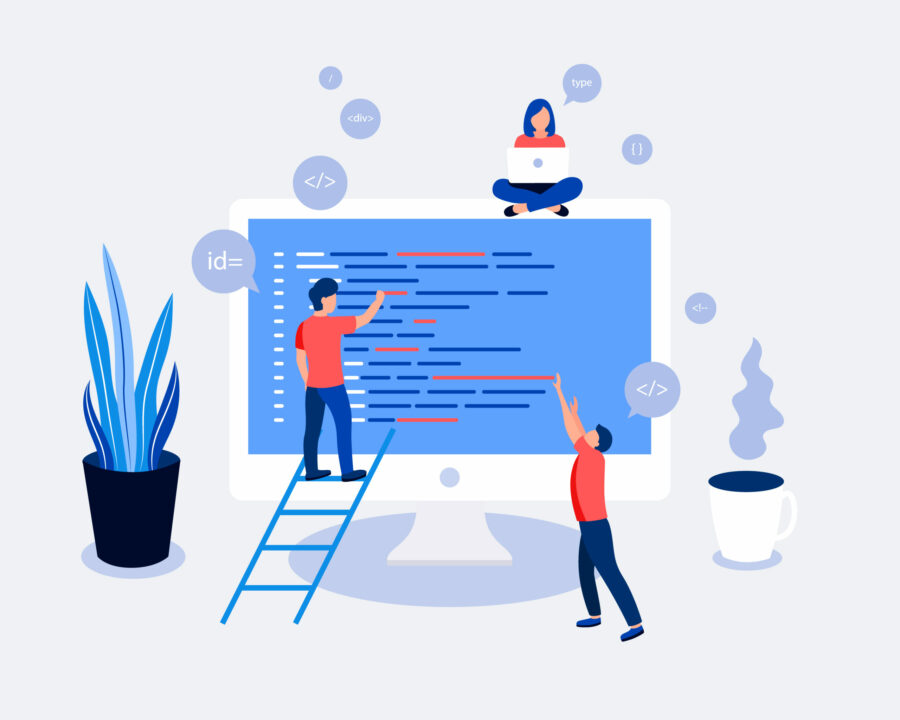Mobile app development on Android is a difficult task. To make your program together, you’ll need to combine several modules, such as the user interface, structure, and configurations. So, how to develop Android apps faster and how to make this process easier? Is there a way to make it happen?
An integrated development environment (IDE) is one of such tools. Developers utilized simple text editors for coding before the advent of IDEs, storing the application in a text editor, running it through the compiler, checking for faults, and returning to the editor to double-check the code. This entire process took a lot of the developers’ time and efforts because they had to move between different programs all the time. This is where an IDE comes in handy, as it brings all of the necessary developer tools altogether in one place. An integrated development environment (IDE) is a software program or a collection of tools that you can use to write and test software. In a nutshell, an IDE is a collection of basic tools for developing apps. A text editor, build automation tools, and a debugger are all included in an IDE. Additionally, several IDEs offer an option of installing plugins to enhance their functionality.
IDE for Mobile App Development: the Key to Improving Productivity
There’s no denying that the IDE has made the development environment for Android apps easier than ever before by bringing all developers’ tools together in a single interface. IDEs can raise a developer’s productivity by lowering setup time, increasing development speed, and keeping them updated, among other things. Adjunctive features: compiler, source code editor, language support, debugger, code completion, integrations, and plugins, integrated development environments offer emulators. Emulators imitate a mobile device model within the IDE, allowing you to see how your app looks and works on a mobile screen without needing to use a real phone. After developing an app it is necessary to test a mobile application for various Android devices. For this, emulators are used to see how the produced mobile app performs on various screen sizes and resolutions, CPUs, and memory capacities. With hundreds of new models hitting the market each year, app developers can’t buy and test their software on all of them. This is one of the major benefits of using an IDE for mobile app development. So let’s dive into the best mobile development integrated development environments.

Which IDE Should You Use?
- Android Studio is a popular development tool that includes high-level functionality to make the personality development of Android apps easier. Virtual devices are one of the most important aspects. Anyone may download and use Android Studio for free. It supports Java, C, C++, Kotlin, and XML programming and is available for Windows, macOS, and Linux. Netflix, Duolingo, Shareit, and Truecaller are some of the most well-known Android apps created with Android Studio.
- Eclipse is a free and open-source integrated development environment (IDE) for developing Java and other programming language applications. Eclipse has numerous plugins and customizations available that make Android app development services easier. It is available to download for free and run on Linux, Mac OS X, and Windows. Eclipse can also be used as a cloud development environment, allowing you to create apps directly from your browser. The Eclipse IDE is used to create the majority of Android games.
- Microsoft’s Visual Studio debuted the Visual Studio with Xamarin IDE for Android app development a few years ago. It interacts with Xamarin for mobile app development. Debugging, syntax highlighting, intelligent code completion, snippets, code refactoring, and embedded Git are just a few of features included in Visual Studio. It supports C, C++, C#, F#, JavaScript, and more programming languages. Storyo, Olo, Fareboom, and PictureX are some of the most well-known Android apps built with Visual Studio.
The Benefits of Custom Android App Development Services
The process of designing, developing, and delivering custom software applications for individual consumers is known as custom application development. It is frequently done in-house or by a third party, and follows the same processes and methodologies as ready-made application development, but with a much narrower focus.
- The most obvious advantage of custom Android app development services is that, unlike off-the-shelf software, the app generated is tailored to your company’s specific demands. This implies all of your requirements will be met, saving you time, effort, and money in the long run.
- Custom-made apps are far more difficult to hack because they are exclusively utilized within one company and may have additional degrees of security, making them less appealing as data sources for hackers.
- You can ensure that laborious and repetitive processes are automated with bespoke application development, saving you time and allowing your employees to focus on the vital duties that only humans can handle. Whether it’s sending emails or moving data automatically, custom software can take care of tedious tasks and increase the efficiency of your company.










Comments